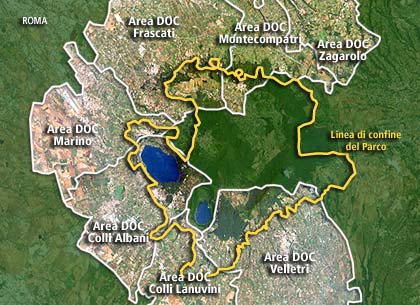
The Colli Albani's area originated from a volcano that was active during the
quaternary. The different explosion phases began 700.000 years
ago and ended 20.000 years ago. The volcanic structure covers
an area of 1500 km², its shape is that of a truncated cone
with an height of 1 km (the highest height is that of the Monte
Faete, 956 metres above the sea level). This structure is in
its central part steeper than the surroundings, its depression
reaches a diameter of ten kilometres.
The past splendour of the Colli Albani's thick forests
is marked by a series of woods characterized by different arboreal
kinds: hornbeams, lindens, maples, elms, common beeches, and
several types of oaks. This vegetation was gradually substituted
with the plantation of chestnut trees during the 17th century,
and now the chestnut is the commonest of the area's trees.
On the Colli Albani's southern slopes there are trees
which grow in heater and dryer climate: ilexes and English oaks,
together with shrubby plants such as strawberry trees, the viburnum,
the heather, the cistus, the butcher's-broom, and sometimes
the holly. This area is also characterized by the scopiglieto,
i.e. bushes of brooms with yellow, sweet-scented flowers. It
is a “pioneer” species, that can grow on poor and
dry soils.
Among the mammals there are: foxes, weasels, hedgehogs, porcupines
and hazel mice; the latter is a small dormouse, that builds
its spherical nest, where it spends the winter sleeping, with
leaves and twigs. Among the daily birds of prey: there are buzzards,
kestrels, hawks. At dawn, you can hear the calls of nocturnal
birds of prey: that of a small migratory owl, the scops owl,
very repetitive, and that of the little owl, well-known and
wrongly feared.
During winter, in the water of the lakes Albano and of Nemi,
there are groups of ducks and other water-birds, coming from
central and north Europe. In the woods there are: picus virdis,
the dendrocopus major, (its presence is marked by nesting cavities)
and the tree-creepers, a small passerine with a down curved
beak, and woodpecker-like habits.
Among the Mediterranean birds there are: the sparrows, with
its slate-grey feathers and a fluted chirp, and the white-throats.
Among the commonest reptiles, there are: the lizards, the green
lizard, with its emerald green skin, and the Aesculapian snake,
an innocuous greenish snake, that eats mice. Among the amphibians
there is the brownish frog, with terrestrial habits.
The whole volcano's area belong to the Parco Regionale dei
Castelli Romani, an institution that was created to safeguard
the integrity of the area's natural species.
|

